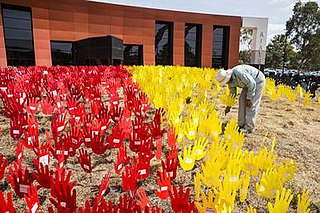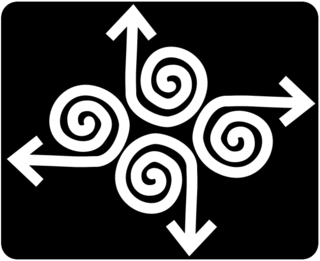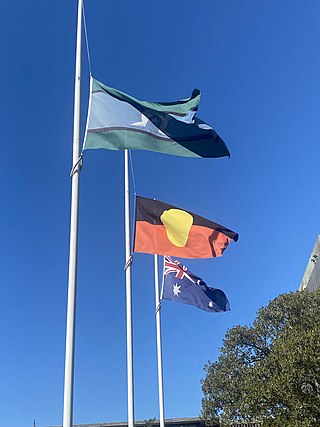Related Research Articles

Lowitja O'Donoghue, also known as Lois O'Donoghue and Lois Smart, was an Australian public administrator and Indigenous rights advocate. She was the inaugural chairperson of the Aboriginal and Torres Strait Islander Commission (ATSIC) from 1990 to 1996. She is known for her work in improving the health and welfare of Indigenous Australians, and also for the part she played in the drafting of the Native Title Act 1993, which established native title in Australia.
Reconciliation Australia is a non-government, not-for-profit foundation established in January 2001 to promote a continuing national focus for reconciliation between Indigenous and non-Indigenous Australians. It was established by the Council for Aboriginal Reconciliation, which was established to create a framework for furthering a government policy of reconciliation in Australia.

The Australian Institute of Aboriginal and Torres Strait Islander Studies (AIATSIS), established as the Australian Institute of Aboriginal Studies (AIAS) in 1964, is an independent Australian Government statutory authority. It is a collecting, publishing, and research institute and is considered to be Australia's premier resource for information about the cultures and societies of Aboriginal and Torres Strait Islander peoples.

A truth commission, also known as a truth and reconciliation commission or truth and justice commission, is an official body tasked with discovering and revealing past wrongdoing by a government, in the hope of resolving conflict left over from the past. Truth commissions are, under various names, occasionally set up by states emerging from periods of internal unrest, civil war, or dictatorship marked by human rights abuses. In both their truth-seeking and reconciling functions, truth commissions have political implications: they "constantly make choices when they define such basic objectives as truth, reconciliation, justice, memory, reparation, and recognition, and decide how these objectives should be met and whose needs should be served".

The Native Title Act 1993(Cth) is a law passed by the Australian Parliament, the purpose of which is "to provide a national system for the recognition and protection of native title and for its co-existence with the national land management system". The Act was passed by the Keating government following the High Court's decision in Mabo v Queensland (No 2) (1992). The Act commenced operation on 1 January 1994.
Indigenous Australian self-determination, also known as Aboriginal Australian self-determination, is the power relating to self-governance by Aboriginal and Torres Strait Islander peoples in Australia. It is the right of Aboriginal and Torres Strait Islander peoples to determine their own political status and pursue their own economic, social and cultural interests. Self-determination asserts that Aboriginal and Torres Strait Islander peoples should direct and implement Aboriginal and Torres Strait Islander policy formulation and provision of services. Self-determination encompasses both Aboriginal land rights and self-governance, and may also be supported by a treaty between a government and an Indigenous group in Australia.

The Redfern Park Speech, also known as the Redfern speech or Redfern address, was made on 10 December 1992 by the then Australian Prime Minister, Paul Keating, at Redfern Park, which is in Redfern, New South Wales, an inner city suburb of Sydney. The speech dealt with the challenges faced by Indigenous Australians, both Aboriginal Australian and Torres Strait Islander peoples. It is still remembered as one of the most powerful speeches in Australian history, both for its rhetorical eloquence and for its ground-breaking admission of the negative impact of white settlement in Australia on its Indigenous peoples, culture and society, in the first acknowledgement by the Australian Government of the dispossession of its First Peoples. It has been described as "a defining moment in the nation's reconciliation with its Aboriginal and Torres Strait Islander people".
Indigenous Australians are people with familial heritage from, and/or recognised membership of, the various ethnic groups living within the territory of present day Australia prior to British colonisation. They consist of two distinct groups, which includes many ethnic groups: the Aboriginal Australians of the mainland and many islands, including Tasmania, and the Torres Strait Islanders of the seas between Queensland and Papua New Guinea, located in Melanesia. The term Aboriginal and Torres Strait Islander peoples or the person's specific cultural group, is often preferred, though the terms First Nations of Australia, First Peoples of Australia and First Australians are also increasingly common; 812,728 people self-identified as being of Aboriginal and/or Torres Strait Islander origin in the 2021 Australian Census, representing 3.2% of the total population of Australia. Of these Indigenous Australians, 91.4% identified as Aboriginal; 4.2% identified as Torres Strait Islander; while 4.4% identified with both groups. Since 1995, the Australian Aboriginal flag and the Torres Strait Islander flag have been official flags of Australia.
Land councils, also known as Aboriginal land councils, or land and sea councils, are Australian community organisations, generally organised by region, that are commonly formed to represent the Indigenous Australians who occupied their particular region before the arrival of European settlers. They have historically advocated for recognition of traditional land rights, and also for the rights of Indigenous people in other areas such as equal wages and adequate housing. Land councils are self-supporting, and not funded by state or federal taxes.

The National Congress of Australia's First Peoples was the national representative body for Aboriginal and Torres Strait Islander Australians from 2009 to 2019.
Indigenous land rights in Australia, also known as Aboriginal land rights in Australia, are the rights and interests in land of Aboriginal and Torres Strait Islander people in Australia; the term may also include the struggle for those rights. Connection to the land and waters is vital in Australian Aboriginal culture and to that of Torres Strait Islander people, and there has been a long battle to gain legal and moral recognition of ownership of the lands and waters occupied by the many peoples prior to colonisation of Australia starting in 1788, and the annexation of the Torres Strait Islands by the colony of Queensland in the 1870s.

Indigenous health in Australia examines health and wellbeing indicators of Indigenous Australians compared with the rest of the population. Statistics indicate that Aboriginal Australians and Torres Strait Islanders are much less healthy than other Australians. Various government strategies have been put into place to try to remediate the problem; there has been some improvement in several areas, but statistics between Indigenous Australians and the rest of the Australian population still show unacceptable levels of difference.

Thomas Edwin Calma,, is an Aboriginal Australian human rights and social justice campaigner, and 2023 senior Australian of the Year. He was the sixth chancellor of the University of Canberra (2014-2023), after two years as deputy chancellor. Calma was the second Aboriginal or Torres Strait Islander person to hold the position of chancellor of any Australian university.
The Closing the Gap framework is a strategy by the Commonwealth and state and territory governments of Australia that aims to reduce disparity between Aboriginal and Torres Strait Islander peoples and non-Indigenous Australians on key health, education and economic opportunity targets. The strategy was launched in 2008 in response to the Close the Gap social justice movement, and revised in 2020 with additional targets and a refreshed strategy.

The Federal Council for the Advancement of Aborigines and Torres Strait Islanders (FCAATSI), founded in Adelaide, South Australia, as the Federal Council for Aboriginal Advancement (FCAA) on 16 February 1958, was a civil rights organisation which campaigned for the welfare of Aboriginal Australians and Torres Strait Islanders, and the first national body representing Aboriginal interests. It was influential in lobbying in favour of the 1967 Referendum on Aboriginal Australians. It was renamed to National Aboriginal and Islander Liberation Movement (NAILM) in the early to mid 1970s, before disbanding in 1978.
Kirstie Parker is a Yuwallarai journalist, policy administrator and Aboriginal Australian activist. From 2013 to 2015 she served as the co-chair of the National Congress of Australia's First Peoples and during her tenure pressed for policies that allowed Aboriginal and Torres Strait Islander Australians to gain the ability for self-determination.
Close the Gap (CTG) is a social justice campaign focused on Indigenous Australians' health, in which peak Aboriginal and Torres Strait Islander and non-Indigenous health bodies, NGOs and human rights organisations work together to achieve health equality in Australia. The Campaign was launched in April 2007. National Close the Gap Day (NCTGD) has been held annually since 2009.

The Aboriginal and Torres Strait Islander Voice, also known as the Indigenous Voice to Parliament, the First Nations Voice or simply the Voice, was a proposed Australian federal advisory body to comprise Aboriginal and Torres Strait Islander people, to represent the views of Indigenous communities.

Reconciliation in Australia is a process which officially began in 1991, focused on the improvement of relations between the Aboriginal and Torres Strait Islander peoples of Australia and the rest of the population. The Council for Aboriginal Reconciliation (CAR), created by the government for a term of ten years, laid the foundations for the process, and created the peak body for implementation of reconciliation as a government policy, Reconciliation Australia, in 2001.
Constitutional recognition of Indigenous Australians refers to various proposals for changes to the Australian Constitution to recognise Indigenous Australians in the document. Various proposals have been suggested to symbolically recognise the special place Indigenous Australians have as the first peoples of Australia, along with substantial changes, such as prohibitions on racial discrimination, the protection of languages and the addition of new institutions. In 2017, the Uluru Statement from the Heart was released by Indigenous leaders, which called for the establishment of an Indigenous Voice to Parliament as their preferred form of recognition. When submitted to a national referendum in 2023 by the Albanese government, the proposal was heavily defeated.
References
- 1 2 "[Home page]". ANTaR. Retrieved 24 July 2020.
- ↑ "Who we are". Edmund Rice Centre. 1 August 2018. Retrieved 24 July 2020.
- 1 2 Giles, Glenn (2002). "'Fair go'? Equality? The people's movement for reconciliation (ANTaR) and critical information literacy". The Australian Library Journal. 51 (3). Informa UK Limited: 203–218. doi: 10.1080/00049670.2002.10755989 . ISSN 0004-9670. S2CID 111838571.
- ↑ Williams, Wendy (5 June 2017). "Rights and Respect For Australia's First Peoples - PBA". Pro Bono Australia. Retrieved 24 July 2020.
- ↑ "Staff & Volunteers". ANTaR. Archived from the original on 28 February 2019.
{{cite web}}: CS1 maint: unfit URL (link) - ↑ "National Close the Gap Day". Oxfam Australia. Retrieved 24 July 2020.
- ↑ "Close the gap". ANTaR. 9 January 2019. Retrieved 24 July 2020.
- ↑ "ANTaR National Close the Gap Day Media Release". Indigenous Allied Health Australia. 20 March 2019. Retrieved 24 July 2020.
- ↑ "Close the Gap report – "Our Choices, Our Voices" (2019)". Australian Human Rights Commission. 21 March 2019. Retrieved 24 July 2020.
- ↑ Nash, Brad (10 June 2020). "12 Ways You Can Help In Australia's Own Fight For Indigenous Rights". GQ. Retrieved 24 July 2020.
- ↑ "Australians for Native Title and Reconciliation (ANTaR)". Australian Indigenous HealthInfoNet. 17 April 2009. Retrieved 24 July 2020.
- ↑ "ANTaR Incorporated". Australian Charities and Not-For-Profits Commission. Retrieved 24 July 2020.
- ↑ "Structure". ANTaR. Retrieved 24 July 2020.
- ↑ "Staff & Volunteers". ANTaR. Retrieved 24 July 2020.
- ↑ "Staff & Volunteers". ANTaR. Retrieved 11 October 2021.
- ↑ "Structure". ANTaR. Retrieved 11 October 2021.